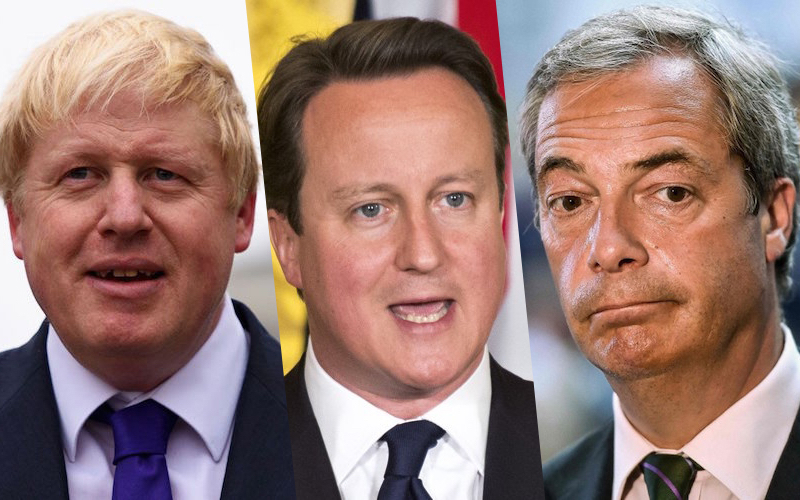
Pathos, Tragedy, Irony and Britain’s EU Referendum
Let me begin with a controversial statement; Karl Marx was wrong and Reinhold Niebuhr was right.
History isn’t governed by the material conditions which divide men and women at birth, nor by the ideas and social structures which arise from those conditions, as Marx would have you believe. All three play their part on the great stage, of course, but the problem with Marx’s conception of history is that it implies purpose, agency, and direction where there are none.
Niebuhr knew better. In his influential study of the United States’ role in the world, The Irony of American History, the Mid-Western theologian convincingly argued that history is the realm of three impish triplets, namely pathos, tragedy, and the eponymous irony.
Pathos refers to a situation “constituted of essentially meaningless cross-purposes in life, of capricious confusions of fortune and painful frustrations,” which “elicits pity, but neither deserves admiration or warrants contrition.” For a situation or historical moment to be considered pathetic, it must be the fault of nobody and be evident to those caught up in it. As Niebuhr states, “suffering caused by purely natural evil is the clearest instance of the purely pathetic.”
Tragedy, meanwhile, refers to a situation where a person or a nation makes a conscious “choice of evil for the sake of good.” This, according to Niebuhr, “elicits admiration as well as pity because it combines nobility with guilt.” Much like pathos, those who are entrapped by the tragic element of history are fully aware of their predicament, but they are forced to make a moral judgement call, to choose from a panoply of evils. Niebuhr claimed that the “necessity of using the threat of atomic destruction as an instrument of the preservation of peace” is a classic example of historical tragedy.
Irony—last but certainly not least—refers to a situation in which the “apparently fortuitous incongruities in life…are discovered, upon closer examination, to be not merely fortuitous.” This is a slightly more difficult concept to grasp, but what Niebuhr is alluding to is a situation where a person or a nation takes a certain action or adopts a certain stance with the aim of achieving one outcome, but in doing so makes the opposite outcome more likely. Unlike pathos and tragedy, irony is defined by ignorance, with the participants being unaware of the irony of their situation.
Niebuhr identifies dozens of instances of historical irony, most notably the idea of American exceptionalism.
Interesting enough, you might be forgiven thinking, but what’s any of this got to do with Brexit and the EU referendum?
Well, although it probably doesn’t seem obvious in the present haze, I’d be so bold as to suggest that the answer to that query is ‘everything.’ You see, Britain’s membership of the European Union, and the question of whether it should endure, appears to encompass pathos, tragedy, and irony in equal measure.
It’s pathetic because the rules of engagement and disengagement were set down years ago by men with distinctly post-war concerns, and because today’s global marketplace is essentially a force of nature, an insurmountable obstacle which thwarts Man’s intellect and willpower at every turn.
It’s tragic because both sides of the debate are forced to operate on complex and ambiguous ethical terrains, choosing between legitimate-but-volatile national sovereignty and illegitimate-but-predictable transnational bureaucracy, between an often illiberal democracy and a reassuringly liberal technocracy, between the economies of scale offered by free trade and the creative destruction free trade visits upon traditional industries and their communities.
It’s ironic because the EU and its predecessors, the European Coal and Steel Community (ECSC) and the Common Market (EEC), were conceived with one overarching purpose in mind—to contain West Germany’s, and later, Germany’s, political and economic influence—and yet, collective efforts in that direction seem to have had the opposite effect. Britain’s formal relationship with the EU isn’t that important in the long run; like all other European nations, our future is a function of the German Question, and as such, will be determined by Berlin, not Brussels.
The truth, unfortunately, is that the electorate was faced with a choice between two evils, and it’s by no means clear which is the lesser of the two. The EU’s relationship with and to capital, labour, and justice is contingent on the topic at hand, while other geopolitical and structural factors, such as the rise of China and India, are likely to shape the British economy in far more profound ways than EU membership. If the architects of the Eurozone are guilty of ignoring Virgil’s advice to “beware of Greeks bearing gifts,” then I’d suggest that self-proclaimed oracles on both sides of the Brexit debate, with their declarations of moral certainty, are guilty of overlooking the Socratic Paradox, “I know that I know nothing.”
So, as we shuffle tentatively towards an obscure post-European future, it would behove us all to keep in mind the first verse of the Serenity Prayer, penned in the 1930s by a young Niebuhr and more recently popularised by Alcoholics Anonymous:
“God, grant me the serenity to accept the things I cannot change,
Courage to change the things I can,
And wisdom to know the difference.”

